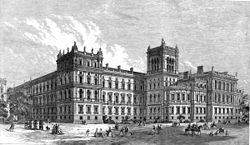User:Til Eulenspiegel: Difference between revisions
| Line 16: | Line 16: | ||
{{clear}} |
{{clear}} |
||
==Notes== |
==Notes== |
||
More scholarly sources, stating that linguists now consider recent finds to show that the Aramaic part of Daniel (chaps 2-7) dates to the Persian Era, and not to 2nd century BC as modern critical scholars had previously alleged: |
|||
*Dr. William H. Shea, ''Daniel, a Reader's Guide'' 2005, p. 22-28 |
*Dr. William H. Shea, ''Daniel, a Reader's Guide'' 2005, p. 22-28 |
||
| Line 23: | Line 23: | ||
( Another school of thought? Or a forbidden school of thought that is banned from wikipedia? ) |
( Another school of thought? Or a forbidden school of thought that is banned from wikipedia? ) |
||
[[/Origins of the Book of Daniel: Timeline]] |
|||
==[[Mahatma Gandhi]] (on the [[India Office]] policy toward [[Indian Independence Movement|Independence]])== |
==[[Mahatma Gandhi]] (on the [[India Office]] policy toward [[Indian Independence Movement|Independence]])== |
||
Revision as of 10:47, 1 July 2010

| SAP-3 | Leywa wahtaka Yesahn nechi-ya ehen ebiwa insahense! |


/Religious narratives as sacred canon
Notes
More scholarly sources, stating that linguists now consider recent finds to show that the Aramaic part of Daniel (chaps 2-7) dates to the Persian Era, and not to 2nd century BC as modern critical scholars had previously alleged:
- Dr. William H. Shea, Daniel, a Reader's Guide 2005, p. 22-28
- Arthur J. Ferch, "Authorship, Theology and Purpose of Daniel" in Symposium on Daniel 1986, 3-83
- Gerard Hasel, "Establishing a Date for the Book of Daniel" in ibid, p. 84-164.
( Another school of thought? Or a forbidden school of thought that is banned from wikipedia? )
/Origins of the Book of Daniel: Timeline
Mahatma Gandhi (on the India Office policy toward Independence)


"First they ignore you, then they laugh at you... then they come to fight you; and then you win!"
Did Gandhi actually say this "famous quote? There's a huge number of published sources claiming he used it (in countless variations) as a recurrent slogan during the nonviolence campaign - but, not one of these sources was published before 2001! The earliest form in print seems to be, as Wikiquote points out, a 1914 US trade union address ("First they ignore you. Then they ridicule you. And then they attack you and want to burn you. And then they build monuments to you"). But the earliest attribution to Gandhi I could find, was first published in 1990 as part of a work of fiction (The Good Fight: A Laura Di Palma Mystery by Lia Matera - "First they ignore you, then they laugh, then they crack dawn [sic], then you win"). [In Oct. 1991, UK Labour MP Tony Benn also made a very similar quote: First they ignore you, then they say you're mad, then dangerous, then there's a pause and then you can't find anyone who disagrees with you.] Then in Apr. 1992, "first they ignore you, then they laugh at you, then they crack down. then you win." appears as a Gandhi quote in alt.activism. It starts spreading around Usenet like wildfire in mid-1998 as posters begin copying it from one another's "sigs", mutating slightly over time, then it appears in literature a few years later. At least one recent source even attributes it to Arun Gandhi, living grandson of Mahatma Gandhi. -- by Til Eulenspiegel (talk)
Code of Ur Nammu
--GeeJo (t)⁄(c) • 17:51, 11 July 2007 (UTC)
Counter-vandalism award

You get this award for all your hard work on reverting vandalism. This award was made for people who are good at vandalism fighting, and you are one of them. have a fun day! 1() 18:03, 7 October 2007 (UTC)
Did you know?
--Bookworm857158367 (talk) 22:36, 12 January 2008 (UTC)
DYK for Appomattoc
BorgQueen (talk) 09:05, 2 October 2008 (UTC)
DYK for Nemattanew
Gatoclass (talk) 02:51, 9 November 2008 (UTC)
DYK for Tutelo language
Materialscientist (talk) 18:02, 14 April 2010 (UTC)
